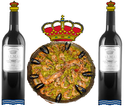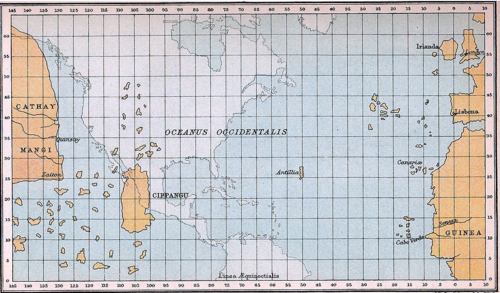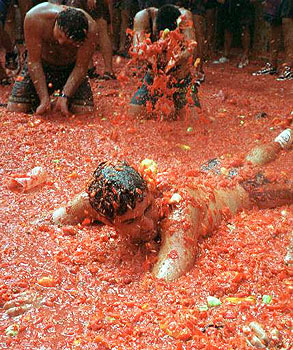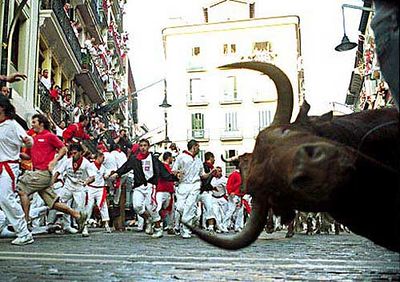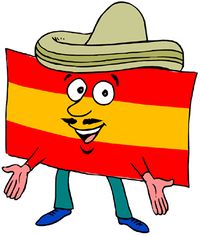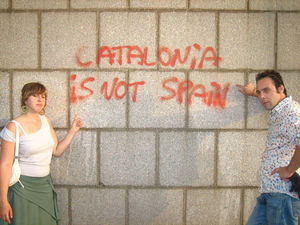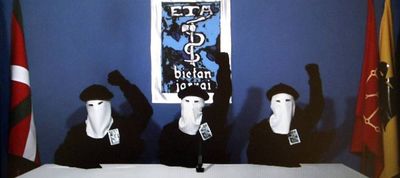Spain
España The Holy Roman Catholic Empire of Spain or Paellalandia Spain | |||||
|---|---|---|---|---|---|
| |||||
| Motto: "Todo Tarda Tanto." ("Everything takes ages.") | |||||
| Anthem: It literally has no words to it. It's just music. Easy to remember. | |||||
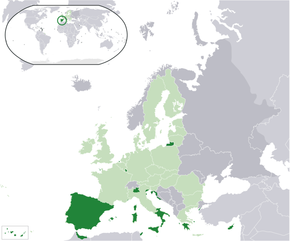 | |||||
| Capital & Largest City | Madrith | ||||
| Demonym | Muchacho | ||||
| Official language(s) | English, German, Spanish (only in surviving areas) | ||||
| Government | Constitutional Monarchy | ||||
| ‑ President | Temp doing job | ||||
| ‑ The King of party | Felipe VI | ||||
| Favorite Word | Joder | ||||
| National Hero(es) | Anyone who plays sports well (Rafa Nadal, Iker Casillas, Fernando Alonso) | ||||
| Currency | Euros, Ham, Cheese, Wine, Mullets | ||||
| Religion | Pretend Catholicism (useful for days off) | ||||
| Population density | No | ||||
| Time Zone | Same as Hitler's | ||||
| National animal | A dead bull carcass | ||||
| National sport(s) | Bull-stabbing | ||||
| Hours of operation | 9:00 – 11:30 am 4:00 – 5:00 pm | ||||
| Drives on | Empty stomach | ||||
“What’s a vegetarian?”
– People of Spain
Spain (Spanish: España), formally the Republic of Spain (Spanish: República de España), is a country[1] in Western Europe. It is bordered by France to the north, Portugal to the west, and Catalonia, Gibraltar to the south, the Republic of Galiza and the Basque country on the inside. It is the thirteenth-richest country in the world by GDP, and the world's leader in unemployment.
While the de jure government are representatives of the Spanish people, the de facto government are representatives of the millions of British and German tourists who descend on Spanish beaches all year long. In general, the elected leader of Spain is the British tourist who can jump from the highest balcony into a swimming pool while drunk without breaking a bone or dying.
Spain is known for its gastronomy, screaming music, jealous lovers and long sleepy weekends.
History[edit | edit source]
Spain was a peaceful place until civilized man appeared. The Carthaginians under Hannibal were hanging out in Spain until 210 B.C. when the Roman Empire showed up and kicked them out.
The Romans held control of things until these bad asses called the Visigoths showed up.
In the 8th century all that came to an end when Muslims (who liked to be called Moors) quickly slaughtered the Visigoths. The Moors set about Islamicizing southern Spain by covering it with minarets, tranquil gardens and fragrant orange groves.
The Moors left a huge influence in Spain, from the wailing vocals of mariachi (uncannily similar to an Arab being shaken until the dates fall out of his pockets) to the swarthy colouring of the people (interracial lovin' goin' on) to their architecture. Northern Spaniards are more pale, and Southern Spaniards have a healthy appreciation for Allah. They also left English-speakers more and moorish puns.
The attempts of the Christian kingdoms of what is modern-day northern Spain to take back the south endured mixed fortunes. The reconquista lasted some 780 years, and has contributed to the stereotype that it takes ages to get anything done in Spain.
Perhaps the most notable example of the struggle between the two creeds is the "Mosque-Cathedral" of Córdoba. Like southern Spain itself, it was Christian in 600 A.D., Muslim for a few centuries after that, and then retaken by the Christians, becoming the world's only example of a cathedral inside a mosque.
The metamorphoses continued into the 21st century; the building is now a Visigoth church turned Mosque turned church turned cathedral turned communist recruitment centre turned fascist interrogation centre turned 1960s hotel turned Chinese discount store.
The hotness of Imperial Spain[edit | edit source]
One key factor in the reconquista was love-making.
Senior members of various Spanish kingdoms started hooking up and forming alliances. The Crown of Aragon got it on with Catalonia and Valencia, and when Isabel I of this new Super-Duper-Aragon hit up Fernando V of Castille, things really started getting hot.
By 1492 all Muslims were driven out of Spain, except those who swore allegiance to the crown and promised to open late-night supermarkets. The Jews were expelled for shits and giggles. Christopher Columbus, who had begged both Spain and Portugal for years, was finally given boats to sail west in search of the east. The more logical eastward route was somewhat complicated by the presence of butt-hurt Moors.
Columbus sailed west from Spain to prove his hunch that the World was indeed flat, and maybe peek over the edge to take some pictures. Using contemporary maps, he believed Japan was only as far west as Acapulco. He never made it to the Pacific or indeed to Acapulco, but what he did find was arguably even more sexy: a whole New World full of gold and Caribbean women wearing very little.
Shortly after his arrival, Columbus was kidnapped and held for ransom by Native American Drug Cartels. Unfortunately for Columbus, the Spanish Crown was utterly broke from all the Conquistadoring, and he was buried alive under 300 pounds of Cocaine. The Atlantic Drug Trade was highly profitable for Spain, though, and they named this land Columbia in honor of his great discovery.
Fernando and Isabel's child, Joanna the Mad (the self-styled “Her Royal Hotness” HRH), liked the rough stuff more than ruling the country, and feigned schizophrenia so her relatives would keep her locked up.
Phillip the II maintained the sexual family tradition by hitting the low countries hard. He was also ravaged the far east: they named the Philippines after his exploits. Several thousand G.I.'s would follow his example in WWII.
While Conquistadors were busy conquering the peoples of Latin and South America, the Spanish Inquisition began a popular national quiz show, in which you couldn't exactly win big, but the booby prizes provided their own kind of incentive to answer the questions right.
After Charles II died childless, Spain had several unsuccessful conversations with everyone around about who should take care of the Atlantic, America and ... well, half the world. By 1714 Spaniards had to have an enforced siesta, leaving Great Britain to take over the world for two hundred years, and more importantly to take Gibraltar for sunbathing and monkey-viewing purposes.
In the 1800s Napoleon invaded, only to be kicked out by the outraged locals, who were indignant at being suddenly awakened without warning.
Latin American Exploits[edit | edit source]
Unlike North America, Spain did not intentionally exterminate the Native inhabitants of her colonies, force them into casinos, or give them free booze. Rather, they found it more beneficial to use them for slave-labor and sexual favors instead.
All this sex and conquest didn't go unnoticed by the Pope, who insisted the Natives be converted to Catholicism before any fornication happens. This presented an unusual dilemma for Spain, as things were getting so hot in Latin America that Catholic Spaniards began having children with the Catholic natives they were supposed to be oppressing. Naturally, these mixed Euro-Indigenous peoples started bitching about being oppressed when they realized they weren't all that different from their oppressors.
Thus, taking inspiration from India (Columbus be praised), Spaniards created an artificial Caste system with fake barriers that don't mean anything. This way, the oppressees wouldn't realize they were being oppressed because they'd be too busy oppressing each other to complain about the Spaniards who were doing the real oppressing. Now I'm confused. But isn't that the point? Well... Yes and No. Nobody cared as long as orgies continued without interruption.
Although the The Spanish Caste System (Sistema de Castas) was completely sensible made no sense, could you expect more from nation whose highest sport is running from murderous farm animals? Abstract thought was never the Spaniard's strong suit; they are a pragmatic people after all, and this system seemed to work just fine.
The Caste operated on a very simple racial hierarchy based on the proportion of Aryan Spanish blood in a person. The tiers (top to bottom) are as follows:
- Italians
- Proto-Finnic Holy Romans
- Neo-Aryan Spaniards
- Europeans (no slavs)
- Iberian-born Spaniards (Tortillos)
- Spaniards born in shithole countries (Tostitos)
- Mixed Indigenous-Spaniard (El-Chapos)
- Mixed Caucasian-African (Del Tacos)
- Big Booty Latinas (Jayllos)
- American Indians (HeyaHeyallos)
- Real Indians
- Arabs
- Coconut
- Africans (El Crappos)
You may be asking, "Why are Africans at the bottom at the list?" Well, they were higher on the list, but fell from grace for a few reasons. First, as the Atlantic Slave Trade was burgeoning, the Spaniards realized that African Slaves were far less mouthy than their South American counterparts, who were always blitzed on Colombian Cocaine. While this greatly increased productivity, it destroyed the White man's sanity.
Moreover, Latina Women were getting so hot with Caucasians that they became susceptible to jealous fits of rage— castrating the Spaniard in his sleep. Needless to say, the Spanish Government was looking for every reason to appease the Loco and bring down the Negro. Natives were also dying in the fields over what was described as "a minor case of the sniffles."
The final nail in the coffin came when a major dispute developed between Spanish King Philip II and American Rapper Kanye West. Philip II became disillusioned with Kanye's racist homophobic rants, and felt he was giving White Europeans a bad name. At first Philip was delighted to learn that Kanye was defending God-fearing antisemites like himself, but soon remembered that all newspapers in Spain were run by Jews. It would be a bad look for the Monarchy if they started digging up his old Tweets, not to mention the effect this would have on LeBron's legacy.
Consequently, Philip demoted Africans to the bottom of the Caste without chance of parole. In order to save face, Philip made a series of Tweets condemning Kanye's deplorable behavior— hoping this would placate the Liberals. As a plus, maybe they'd forget about the whole Spanish Expulsion of the Jews thing from 100 years prior.
It's fucking insane that Alex Jones is the most reasonable in person that room. Sure I agree with him, but at least I'm quiet about it. ~Philip II on Kanye West
The less hot non-imperial period[edit | edit source]
The 20th century was a period of constant change: a military revolution led by Francisco Franco, a brief republic which tried to legalize all kinds of liberal stuff thirty years too early, a civil war and a fascist dictatorship which lasted so long it could make an Italian nod with approval.
After several decades of successful totalitarianism marred only slightly by the repression of regional identities and a touch of poverty, Franco softened in his old age: he reinstated the monarchy, allowed a kind of Diet Coke version of democracy, and had the novel idea of offering British people the thrilling combination of hot sun and cheap beer.
The Hispanosphere (whatever that means)[edit | edit source]
The Spanish speaking world has a tedious and convoluted ethnic history that prides itself on confusing White Anglo-Saxon Protestants. The Iberian peninsula has a variety of dialects and boring ethnic groups that nobody outside of Spain cares about. However, American tourists looking for an exotic vacation in Spain will be bewildered to find.... even more White people. "Where are the short mocha men in Sombrero's with tiny guitars?" "Why is there a Mosque here?" "Why does everyone talk with a lisp?" Fear not, the only illegals here were deported 500 years ago. You got lost in the Hispanosphere!
Indeed, Spanish influence reaches far beyond the mother country. Outside of peninsular Spain, which nearly destroys itself every couple of years, there are 20 other Hispanic countries that do the same thing. Fascist Dictators; Cigar Smoking communists; Republics Governed entirely by Fruit, Hispanics have seen it all. For convenience, the stability of each country is ranked on a scale ranging from 'Mild' to 'Diablo,' with Diablo being the most unstable spicy.
Most countries on the Diablo list are run by lawless Cartels— a Texas Libertarian's wet dream. Paradoxically, the citizens of these countries wish to leave this paradise en masse and come to Texas, while Texans participate in a drawn out game of cat-and-mouse with ropes and small cages. Texans take this game very seriously.
A visit to Spain, unlike Latin America, will not involve a 50% chance of death. However, all Europeans visiting Spain must consent to being drafted should another Civil War break out. The term ‘Hispanic’ is synonymous with Ethnic Clusterfuck, so don’t feel bad about being confused, idiot.
Language[edit | edit source]
Spain gave the world Spanish: the second-most widely spoken language in the world, with almost four hundred million natives spitting out words like machine guns. There are two genders, five words for "you", more than five thousand irregular conjugations, and a nillion obscenities, all beginning with "I shit on ..."
The language spread with the Spanish Empire, with local tribes deciding they preferred a language that was written in ink rather than in the holy blood of sacrificed infants.
Today it is also one of the most studied languages around the world. Producers of Spanish language text books and dictionaries are obliged to use yellow, red, or orange as their main color combinations.
Despite Spanish's success outside of Spain, it has mixed popularity inside the country, with some Spaniards preferring to speak Catalan, Valencian, Basque, Galician, Occitan or English.
Occasionally, the name of the language is even called into question. Nearly four hundred million native speakers might call it español, but at least ten million insist on calling it castellano, just to make clear that it is not the Spanish language but rather one of several Spanish languages.
Even among Spaniards who are happy to speak Spanish castellano, there is considerable confusion. Unlike other Spanish speakers, people in Spain often lisp, but cannot decide when they should do it. Traditionally, a "th" sound should be made for a "z" or a "c" when it comes before and "e" or an "i". This is maintained in Don Quixote's old stomping ground, Castilla-La Mancha, but many variants can be found, see below.
| la casa (the house) | la caza (the hunt) | la caca (the poo) | la cerveza (the beer) | |
|---|---|---|---|---|
| Quixote-land | "la kasa" | "la katha" | "la kaka" | "la thair-betha" |
| Seville, Cordoba, and the odd few Catalans and Basques | "la kasa" | "la kasa" | "la kaka" | "la sair-besa" |
| Most of Andalucia | "la katha" | "la katha" | "la kaka" | "la thair-betha" |
| Andalucian Countryside | "tha thatha" | "tha thatha" | "tha thatha" | "tha thair-thetha" |
And just in case you thought that the capital might be a bastion of correct Spanish, think again. For some reason, Madrileños are the only Spanish speakers in the world who even make the last "d" in a word into a "th".
| Madrid | |
|---|---|
| Madrid | "Madrith" |
| Everywhere else | "Madrid" |
If you prefer not to speak any of the above dialects, one solution is to cram your face with food. So, on to cuisine.
Cuisine[edit | edit source]
Spain has one of the most famous and distinct cuisines in the world. Its customer service is also renowned, for different reasons. To sample the experience of trying to get the waiter's attention in a Spanish restaurant, click below.
Tapas[edit | edit source]
Tapas are small portions of food which are often served with drinks. The culture developed during the famine at the beginning of the 20th century, when many Spaniards were forced to eat a single olive for breakfast, sniff anchovy paste for lunch, and share a potato for dinner.
One variety of tapas are pinchos. These are tapas held together by toothpicks which should be kept, tallied and paid for when settling. Note that tourists are the only patrons who don't bury, burn, swallow, hide or obliterate the toothpicks.
Paella[edit | edit source]
Paella, despite being one of Spain's most famous dishes, is arguably its most mispronounced. Speakers should pronounce both l's, producing a three syllable word along the lines of "pie-el-la". Failure to sound both l's in authentic fashion often causes amusement among natives, who never tire of laughing at misinformed tourists asking for "pie-eh-ya".
Tortilla[edit | edit source]
Spanish tortilla is exactly the same as its Mexican namesake: a round piece of flatbread made from corn or wheat, stuffed with meats, vegetables and cheeses and folded every which way but loose.
As a joke, when tourists order tortilla, Spanish waiters will often give them la patata de verguenza (literally, "the potato of shame"), a kind of potato pie.
The expected response to this is for the tourist to click his fingers in the air and shout "ándale, ándale" until the tacos and hot sauce are brought out.
Salad[edit | edit source]
Salad was prohibited during the war because it was associated with communists and now, although technically legal, it is difficult to find in Spanish restaurants. Valiant diners may try their luck by asking for ensalada rusa (Russian salad) in hushed tones. In some cases, restaurateurs will accordingly serve a sad portion of lettuce, dry tomato, and not much else.
Status of tuna[edit | edit source]
Despite the lack of salad, one delicious vegetable you will find in abundance in Spain is tuna. This vegetable, often served in small chunks, is usually the primary ingredient in Spanish vegetal dishes.
Drinks[edit | edit source]
Sangría[edit | edit source]
Many countries make shit wine, but only Spain had a good idea about what to do with it: mix it with lemonade, and liberally add whatever spirits you have in your cupboard which you cannot describe without using the words "fucking strong".
Many sangría recipes actually insist that the wine used be cheap. However, bear in mind that in Spain it is possible to buy a bottle of red wine for less than a bottle of milk.
If faced with an irretrievably, cheaper-than-milk bad bottle of wine, a true Spaniard will decline the possibility of making sangría and toss in some Fanta (for Tinto de Verano), Coca Cola (for Kalimotxo) or basically any soft drink that will take the head off the wine.
While traditionally these drinks were simply a last resort for locals to get tipsy, they are now widely recognised as a useful way to get foreign blonde girls completely hammered and into bed.
Milk[edit | edit source]
For reasons best known to themselves, the Spanish prefer UHT milk. This beverage exists in a purgatorial state, in which it is never actually "good", but nor does it seem to go "bad".
Soft drinks[edit | edit source]
Similarly, in a country where the temperature rarely drops below 70 degrees, locals have developed the odd custom of keeping all soft drinks away from refrigerated areas in the supermarket.
Café con leche[edit | edit source]
Café con leche (coffee with milk) is among the most relaxing drinks to have in the world. Spaniards usually have one in the Plaza Mayor in Madrid.
Sports[edit | edit source]
In Spanish, the closest translation of "sport" is deporte (literally, "unsporting"). This is reflected in Spain's love for uneven contests.
Uneven contest between man and bull[edit | edit source]
Tauromaquia (bullfighting), is one of the most distinctive sporting traditions in Spain. Students of Spanish may well notice the word's resemblance to maquillaje (makeup). This is no coincidence. The sport began as an attempt to "beautify the beast", and young toreros would risk their lives in the attempt to leave the local bulls looking as feminine as possible, covered with blusher and eye liner.
This led to much gouging and death. Spaniards quickly realised that bulls are intelligent enough to learn from their encounters with humans, and that a bull who had undergone one session of makeup was likely to be a deadly adversary. The sport accordingly developed in such a way that professional toreros were expected only to make up bulls who had never encountered a man before.
The deliberate targeting of inexperienced bulls changed the nature of the sport, but men continued to be killed. A second major development in the sport was initiated by Isidro R. Ramirez, known as El Cid. Ramirez, who, after losing four of his brothers to a gorgeous bull called José Maria, began to kill the bulls after making them look real pretty.
The variation on the traditional practice caught on, so much so that today murdering the bull has become the main facet of tauromaquia, with its feminine origins reflected only in the girly costumes of the toreros and the pretty little banderillas (literally, "gay sticks") that are pushed into the bull's shoulders before it is killed.
Uneven contest between two football teams and the rest[edit | edit source]
There are many football teams in Spain, but all but two of them are made up of amateurs, homosexuals, beggars, alcoholics, and in two notable cases, animals. The two exceptions, Real Madrid and Barcelona, win everything and take all the money.
The average Spaniard spends 42 hours a week speaking about or watching football, despite the fact that the storyline is exactly the same every year.
Uneven contest between Spanish footballers and other men[edit | edit source]
Top footballers in Spain get exorbitant wages, and in a curious coincidence, they get poontang any time they want to. They supplement the millions they receive from their clubs by advertising potato chips, headache tablets, detergents, banks and – regardless of their natural beauty – men's cosmetic products.
This last example makes for some eyebrow-raising commercials, in which totally unremarkable looking men are elevated to the roles usually occupied by male models in shampoo and shaving ads.
The phenomenon perhaps reached its zenith with Carlos Puyol, one of the ugliest men ever to walk on Spanish soil, who managed to date and impregnate smoking-hot Sports Illustrated model Vanesa Lorenzo.
In other countries, this obvious injustice may have led to some kind of violent uprising, but in Spain, where the average man attempts to charm the woman of his affections by splashing out with what he has left of his €1000-a-month pay packet, it is hailed as a fine example of deportividad (roughly, "cheating to win").
Flag and colours[edit | edit source]
The flag of Spain consists of three horizontal stripes: two narrow red stripes at the top and bottom, and a thick golden stripe through the middle, which is often treated as a kind of improvisational area in which to add extra emblems, coats of arms, bulls, octopuses or dictator's faces.
The gold symbolizes to the riches that Spain borrowed from the native population of the Americas for safe keeping.
The red symbolizes many aspects of Spanish culture, not least the fact that the red sun never set on the Spanish empire. Even now that the empire has shrunk a tad, it must be said that Spain is still sunny a lot of the time, and also Spanish people usually have blood that is red – and traffic lights also flash red when cars are technically expected to stop.
Manners[edit | edit source]
No.
Regions of Spain that hate Spain[edit | edit source]
Catalonia[edit | edit source]
Catalan nationalists maintain that they are an entirely different people from the Spanish, a claim somewhat undermined by the fact that many of them speak Spanish as their dominant language, have a red-and-yellow flag, eat tapas, paella and pinchos, have siestas, don't eat dinner util 10:00 pm, don't eat anything a real human would consider breakfast, have a six-inch sub at 11:00 am, love reggaeton, stop working for Christmas, Easter and August, are obsessed with the Spanish football league and have a parliament which never seems to get anything done because the would-be coalitions can never agree on anything.
Catalans also feel aggrieved that they live in the only region on the entire earth that pays more in taxes to the central government than it receives.
It is important to note that Catalans speak Catalan instead of/as well as Spanish, and despite the fact the two languages are similar, and that Catalonia is a region, one should not fall into the trap of calling it a dialect. This will upset any right-thinking Catalan, although as they are typically bespectacled and weight 150 pounds soaking wet, you at least have no fear of a physical reprimand.
Basque country[edit | edit source]
The Basques are a mysterious people, possibly descended from the survivors of Atlantis or perhaps a European tribe no one else wanted to hang with. As a result of their cultural and genetic isolation, they have no yellow in their regional flag, and decline to speak a language remotely related to Latin.
In their spare time, Basques enjoy playing sports which involve ripping the heads off dead geese.
The Basque country earned considerable notoriety in the 1970s and 1980s as the home of ETTA, a terrorist organization obsessed with Etta James.
Basque separatists even today insisting on singing the words of "I'd Rather Go Blind" when the Spanish national anthem is played.
Interestingly, the word eta means "and" in the Basque language, a coincidence which has led to many foreigners misinterpreting innocent conversations in bars and soiling themselves.
This region is also home to the village of Pamplona, famous for its annual bullshit.
Spain today[edit | edit source]
Spain today is a marvelous place to live, as long as you restrict your ambitions to working "somewhere or other" and renting a room (not an apartment). Due to the level of paperwork and bureaucracy, inhabitants are encouraged not to a) buy a house, b) start a business, c) get married, or d) renovate. Anything. But the weather really is lovely.
- ↑ If you stretch the definition of "country" a bit

